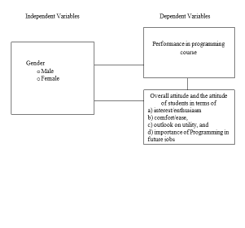Gender Performance and Attitudes in Learning Programming
DOI:
https://doi.org/10.69478/BEST2025v1n1a024Keywords:
Gender Disparities, Programming Education, Stereotype Threat, Gender Bias, Inclusive PedagogyAbstract
This study examined the gender differences, academic performance, and attitudes towards programming among students, employing a mixed-methods approach. The study sample consists of male and female students enrolled in programming courses, with data collected through surveys and academic records. Statistical analyses include descriptive statistics, Mann-Whitney tests, Spearman's rank correlation, and coefficient of concordance to examine differences in performance and attitudes between genders and the relationship between academic performance and attitudes towards programming. Descriptive statistics reveal subtle gender disparities, with female students achieving slightly higher grades on average and exhibiting marginally more positive attitudes towards programming across various dimensions, including interest/enthusiasm, comfort/ease, outlook on utility, and importance of programming in future jobs. Mann-Whitney tests confirm significant differences in performance between male and female students, highlighting the need to address gender disparities in programming education. Spearman's rank correlation helps examine how academic performance and attitudes are connected, showing detailed patterns. While the overall correlation between performance and attitudes towards programming is weak, specific dimensions, such as comfort/ease and outlook on utility, show notable negative correlations with grades, suggesting potential areas for intervention. The study's findings underscore the interconnected nature of attitudes toward programming and the complex interplay between academic performance and attitudes. By fostering an inclusive learning environment and implementing evidence-based strategies, educators and policymakers can work towards ensuring equitable learning outcomes and promoting positive engagement in programming education for all students, regardless of gender or perceived academic aptitude.
References
L. Sun, L. Hu, D. Zhou, “Programming Attitudes Predict Computational Thinking: Analysis of Differences in Gender and Programming Experience,” Computers & Education, vol. 181, May 2022, https://doi.org/10.1016/j.compedu.2022.104457.
L. Hu, “Exploring Gender Differences in Computational Thinking Among K-12 Students: A Meta-Analysis Investigating Influential Factors,” Journal of Educational Computing Research, vol. 62, no. 5, April 2024, pp. 1138–1164, https://doi.org/10.1177/07356331241240670.
F. Napalit, B. Tanyag, C. L. So, C. Sy, J. R. San Pedro, “Examining Student Experiences: Challenges and Perception in Computer Programming,” International Journal of Research Studies in Education, vol. 12, no. 8, November 2023, pp. 101–112, https://doi.org/10.5861/ijrse.2023.71.
J. L. Lupart, E. Cannon, J. A. Telfer, “Gender Differences in Adolescent Academic Achievement, Interests, Values and Life-Role Expectations,” High Ability Studies, vol. 15, no. 1, June 2004, pp. 25–42, https://doi.org/10.1080/1359813042000225320.
A. Pang, A. Padiyath, D. V. Vargas, B. J. Ericson, “Examining the Relationship Between Socioeconomic Status and Beliefs About Large Language Models in an Undergraduate Programming Course,” in Proceedings of 2024 ACM Virtual Global Computing Education Conference V. 1 (SIGCSE Virtual 2024), December 2024, pp. 172–178, https://doi.org/10.1145/3649165.3690099.
S. Cheryan, V. C. Plaut, C. M. Davies, C. M. Steele, “Ambient Belonging: How Stereotypical Cues Impact Gender Participation in Computer Science,” Journal of Personality and Social Psychology, vol. 97, no. 6, December 2009, pp. 1045–1060, https://doi.org/10.1037/a0016239.
S. T. P. Peralta, C. T. Adriano, “Information and Communications Technology (ICT) Integration in Teacher Education Institutions,” The Mindanao Forum, vol. 24, no. 2, December 2011, pp. 151-179, https://ejournals.ph/article.php?id=7107.
A. G. Lopes, “Women in Computing: Attitudes and Experiences,” International Journal of Technology and Human Interaction (IJTHI), vol. 18, no. 1, January 2022, pp. 1–11, https://doi.org/10.4018/IJTHI.302663.
J. Du, H. Wimmer, “Hour of Code: A Study of Gender Differences in Computing,” Information Systems Education Journal (ISEDJ), vol. 17, no. 4, August 2019, pp. 91-100, https://files.eric.ed.gov/fulltext/EJ1219536.pdf.
A. Robins, J. Rountree, N. Rountree, “Learning and Teaching Programming: A Review and Discussion,” Computer Science Education, vol. 13, no. 2, 2003, pp. 137–172, https://doi.org/10.1076/csed.13.2.137.14200.
O. B. Karimi, G. Toti, M. Gutica, R. Robinson, L. Zhang, J. Paterson, P. Lindner, M. O’Dea, “Enhancing Diversity and Inclusion in Computer Science Undergraduate Programs: The Role of Admissions,” in Proceedings of the 2023 Working Group Reports on Innovation and Technology in Computer Science Education, December 2023, pp. 1-29, https://doi.org/10.1145/3623762.3633496.
M. Manzi, S. Caleo, M. E. Heilman, “How Descriptive and Prescriptive Gender Stereotypes Lead to Discrimination Against Women,” Current Opinion in Psychology, vol. 60, December 2024, https://doi.org/10.1016/j.copsyc.2024.101928.
J. R. Shapiro, A. M. Williams, M. Hambarchyan, "Are All Interventions Created Equal? A Multi-Threat Approach to Tailoring Stereotype Threat Interventions," Journal of Personality and Social Psychology, vol. 104, no. 2, June 2013, pp. 277–288, 2013, https://doi.org/10.1037/a0030461.

Downloads
Published
Issue
Section
Categories
License
Copyright (c) 2025 Helen N. Perlas, Helmar C. Ea (Author)

This work is licensed under a Creative Commons Attribution-NonCommercial 4.0 International License.



